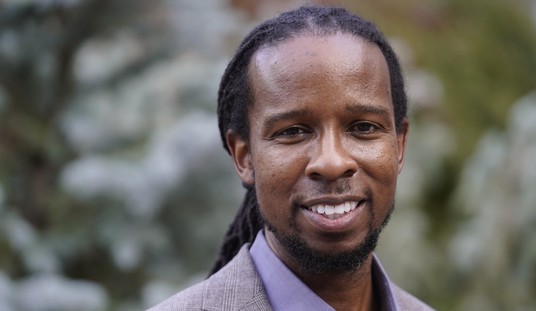Silly, but it’s worth revisiting this subject now that he’s — gulp — the early frontrunner for the GOP nomination.
Mr. Bush is passionately pro-immigration, which may set him apart from some on the right. But he is also passionately pro-rule of law, a principle that guides his entire immigration strategy…
Recognizing that the rule of law requires consequences for illegal actions, Mr. Bush proposes that illegal immigrants who came as adults should be subjected to penalties and not be eligible for citizenship. That proposal ignited a firestorm among liberals when the book was published, even as it helped forge a conservative alternative to the Senate’s “Gang of Eight” immigration bill in 2013. Yet now the proposal is derided in some circles as “amnesty,” when it is anything but.
If that sounds familiar to HA readers, it should: I wrote two posts about Bush’s supposed opposition to citizenship in March 2013 when his book with Clint Bolick, the author of today’s WSJ op-ed, was first published. It seemed strange, I thought, that a guy who’s been touted for years as the Great Republican Hope among Latinos would take a position to the right of other prominent GOPers like Marco Rubio and Scott Walker. In fact, hadn’t Bush endorsed a path to citizenship for illegals not long before his book came out? Here he is in summer 2012:
“You have to deal with this issue. You can’t ignore it, and so either a path to citizenship, which I would support–and that does put me probably out of the mainstream of most conservatives–or … a path… to residency of some kind,” he said during an interview last week with Charlie Rose on CBS.
And here he is writing with Bolick in the Journal in January 2013, just a few weeks before their book, which opposed citizenship, was published:
The only alternatives to increased immigration are mounting debts or reduced social services. A practicable system of work-based immigration for both high-skilled and low-skilled immigrants—a system that will include a path to citizenship—will help us meet workforce needs, prevent exportation of jobs to foreign countries and protect against the exploitation of workers.
How’d he go from pro-citizenship to anti-citizenship in the span of a month and a half? My theory at the time, which I’m sticking with, is that he “evolved” in reaction to Rubio seizing this issue from him by joining the Gang of Eight the same month. Jeb was probably thinking of running for president even then and knew that his niche would be as the pro-amnesty establishment champion; then, suddenly, by making a bold move in backing the Senate immigration bill, Rubio had seemingly seized that niche from him. Bush needed to distinguish himself. So he hit on the idea of making illegals eligible for residency but not citizenship, which would allow them to stay and work but would deny Democrats the new voter base that so many righties are worried about. Seemed like a reasonable-ish compromise for an aspiring presidential candidate.
But it’s not. It’s a terrible idea. Read my two posts about this from last March if you want a fuller argument, but the nutshell version is that residency without citizenship achieves nothing that border hawks want while achieving nothing that the GOP establishment wants. The great conservative fear about an immigration deal has to do with legalization, not citizenship: Once illegals are legalized, as they would be if they were granted permanent residency, political pressure and legal challenges will ensure that they eventually become eligible for citizenship too. You can’t grant residency and seriously expect to hold the line against citizenship. And Bush doesn’t expect to, of course; his position is a political pander designed to lower the heat on him in a primary, not a serious governing strategy. Meanwhile, supporting residency while withholding citizenship is guaranteed to irritate Latino voters, the very demographic that Beltway Republicans are desperate to make nice with before the next election. Amnesty activists like Luis Gutierrez would (and will) call Bush’s plan an immigration version of Jim Crow in forcing illegals to hold a perpetual second-class status where they can do pretty much everything American citizens can do — except vote. The Bush plan would become a political liability for the party, and before long the GOP brain trust — including Jeb Bush — would cave on it and agree to a path to citizenship anyway.
Bush’s defense of his “no citizenship” position is a hash too. Sometimes he argues that it’s a matter of principle, that the rule of law demands that people who followed the rules be treated better than those who didn’t. In that case, though, how come he supported a path to citizenship as recently as January of last year? He’s awfully old and awfully well practiced on this subject to be having epiphanies about the rule of law so late in life. Besides, if the rule of law requires that citizenship be limited to those who came here through proper channels, why doesn’t it require that work permits and permanent residency be limited to them too? Makes no sense. On the other hand, Bush sometimes argues in terms of expedience: We need to withhold citizenship from illegals, he says, so that there’s no extra incentive for people in other countries to try to sneak into the U.S. The more generous you are with amnesty, the greater the “magnet” effect will be. Okay, but is citizenship that much greater of an incentive than permanent residency? Bush himself has noted, entirely rightly, that many illegals don’t care about citizenship; they come here to work and to give their family a better life. Bush’s residency plan would give them all of that. Think that won’t create a mighty large magnet, and that that magnet won’t intensify the pressure to give illegals full citizenship?
Here he is last year telling Joe Scarborough that he’d support citizenship if you could make it happen without creating a magnet effect in the process, notwithstanding the obvious magnet effects in his own plan. If the rule of law demands disparate treatment for legal and illegal immigrants, why support a path to citizenship even hypothetically?








Join the conversation as a VIP Member